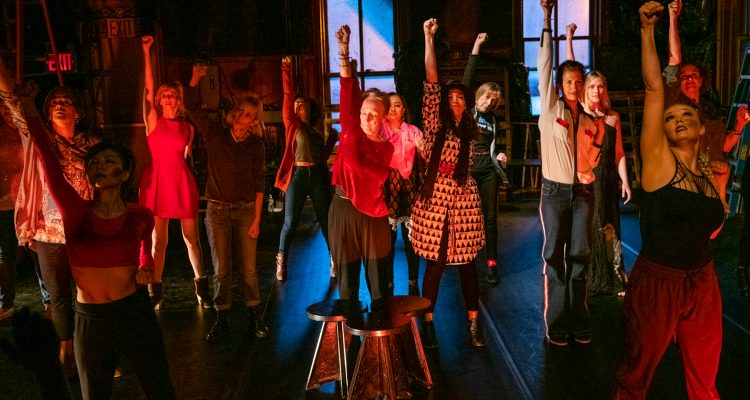On Monday, Nov. 4, the Royal Family Productions brought “Women on Fire,” the dance and theatre performance written by Chris Henry, to the Regina A. Quick Center for the Arts.
As Cheryl Wiesenfeld, the producer of “Women on Fire: Stories from the Frontlines,” said in her introduction before the performance, “Telling our stories and sharing our stories with others is how we will become better as people and better as a society.”
“Women on Fire shares different stories from women of different ages, different ethnic backgrounds and different socio-economic backgrounds,” Wiesenfeld said.
The crowd in the audience was as diverse as the women portrayed on the stage: women in pale off-white cashmere sat next to women in leather lace-up boots and leather pants, men in gray hoodies and sneakers sat next to men in pressed navy suits and shined shoes. There were large groups of students clustered together, whispering excitedly before the event started. Even more, the audience hummed with an expectant energy that continued into raucous applause after each monologue, mirroring the fervent energy of the play.
The performance began with a woman clearing out what looked to be a clay pot, dust from the clay rising into the air. Then, the dancers Gracie Anderson, Kiersten Foster, Maïa Eugene and Camri Hewie began a moving lyrical performance to an original musical composition by Lars Jacobsen. As Anderson, Foster, Eugene and Hewie continued to dance, the actress Kathleen Chalafant came onto the stage wearing a bright red shirt and black pants and began the first monologue, “On Fire.”
Chalafant portrayed an angry woman discussing the pitfalls of the Trump administration. Many women yelled back in response when she yelled, “We are left in a country rotting!”
When she finished her monologue, she crumpled up a piece of paper in her hands and placed it into the clay pot. Chalafant left the stage surrounded by the four dancers, who continued to dance around the next actress, Maddie Corman.
Corman performed the monologue, “I am not a Feminist,” which deftly analyzed and critiqued social structures that disguise harmful hazing as forming bonds between women. Her portrayal of a former sorority sister was moving and poignant. Her character never says her name throughout the monologue as she recounts the “bonds of sisterhood” formed after she and her fellow pledges were made to strip down to their underwear, circle each other’s cellulite and march to the boys’ fraternity house, where the boys threw things at them and touched them “wherever they wanted.”
“After that day, these women have been my sisters. I know I can count on them, whenever I need them,” the unnamed former sorority sister said. “I am a Republican. My family has always been Republican…And yes. I voted for him.”
“Women on Fire” did a wonderful job at showing perspectives from all sides of the political spectrum.
In the monologue, “Where do I Belong?” the character Beth, played by Constance Shulman, asked the audience, “I believe in gay marriage. I believe in gun control, but I don’t believe in abortion. Where does that leave me? Who do I vote for?”
Senior Sam Millette said that “Women on Fire” helped her understand her family members.
“The majority of my family are Republicans and I ended up becoming a Democrat…A lot of the things that were said in the show resonated with me because I have either heard them from my family, experienced them myself, or heard stories from my friends. It was very powerful.”
Freshman Sara Hauck, an international student from Germany, said that the show made her extremely emotional.
“I only came here from Germany two months ago. In Germany, you see what’s going on on TV, but you’re never really in it. You’re able to make your own opinion across the ocean, but being here and hearing other perspectives from other women in this country helped me understand them.”
“I’ve been told, ‘You’re angry. You have no reason to be angry. You just want to have everything to be equal without working for it equally.’ I really related when [the show] referred to women being seen as angry if they spoke up and having to silence themselves to reach their goals,” Hauck said.
Senior Emily Ramsey, associate producer of “Women on Fire,” has been working on doing student outreach for the show since August.
“I was blown away, especially by the ending, which was so powerful. I think what’s great is that this show covers a wide range of different political opinions from people with a lot of different backgrounds.”
“Women on Fire” succeeded in opening up the conversation between people of all backgrounds. Each monologue showed how women are subjugated by societal oppression.
At the end of the play, all of the actresses raised their fists in solidarity, standing by the idea that all stories must be heard and shared in order for our country to repair itself. We must listen to the women with fire in their veins.
As Chalafant said, “I am a woman and you better run when I roar.”


Leave a Reply